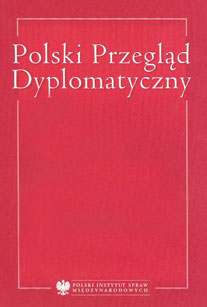Polityka zagraniczna Polski w 1976 roku
Poland's Foreign Policy in 1976
Author(s): Piotr DługołęckiSubject(s): Politics / Political Sciences
Published by: PISM Polski Instytut Spraw Międzynarodowych
Summary/Abstract: The archival research conducted in connection with the preparation of the volume entitled Polish Diplomatic Documents – 1976 provides an opportunity to assess the Polish foreign policy of the day. In the first half of that year, Polish diplomats devoted most of their attention to relations with the Federal Republic of Germany: After lengthy negotiations, an agreement on pensions was signed; Edward Gierek's visit to West Germany, planned for many years, finally took place; and many economic agreement were also signed. The greatest influence on Poland's foreign policy in 1976, however, was the workers' unrest in Radom, Ursus and Płock. During the second half of 1976, the authorities mostly strove to minimize the consequences of the June events on the international stage. The workers' demonstrations in Poland had an impact on both Poland's relations with Western countries and with the USSR and the entire Eastern Bloc. In multilateral relations, the most important issue was the preparations for the Belgrade CSCE meeting. Attempts made to normalize the cooperation between the COMECON and the EEC and Poland's steps with regard to the Lebanese crisis and the conflict in Angola were also significant. In 1976 attempts were also made to improve relations with the People's Republic of China following the deaths of Zhou Enlai and Mao Zedong. The crisis coming upon Poland also led to changes in its economic policies. The People's Republic of Poland unsuccessfully tried to settle its economic relations with other countries in such a way as to limit the negative effects of its own economic collapse.
Journal: Polski Przegląd Dyplomatyczny
- Issue Year: 49/2009
- Issue No: 3
- Page Range: 103-132
- Page Count: 30
- Language: Polish
- Content File-PDF

